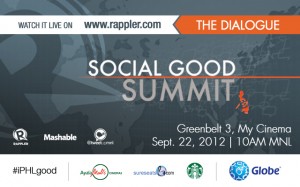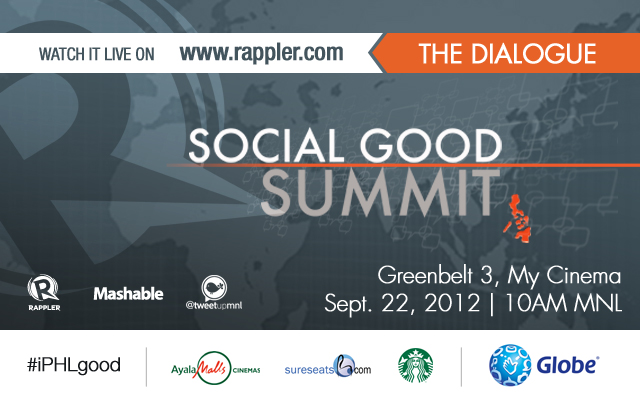 Today, as we tackle social media for social good, I wish to share and call out the elephant in the room…
Today, as we tackle social media for social good, I wish to share and call out the elephant in the room…
Thanks to Filipino netizens, the Philippines has become, since late 2010, the world’s social media capital.
Social media, digital, the web, new media – whatever we call what we do online (and which we do so with such sophistication befitting the title “social media capital”) has become important to a growing number of Filipinos across classes, sectors, regions, causes and industries.
For instance, news media has undergone rapid and radical change. Prior to social media, the public had no direct role in news reportage. Not anymore. Our comments, feedback, tips, citizen reports, trailblazing citizen journalism work from the likes of Blogwatch and others have changed journalism profoundly. The once-captive audience is waking up and directly engaging the networks everyday.
Today, Twitter and Facebook are mainstays across news and entertainment programs in most major TV outlets. Something, someone, some group must satisty our hunger for “breaking news”.
Government is in on the action too, although limited, thanks to the Twitter accounts of PAGASA and MMDA, and Gov. Joey Salceda’s pro-active Facebook presence in his native Albay. (By the way, up to now, the NTC is absent in social media – yes, the very agency in charge of telcos cannot even keep its website up 24/7.) The President’s social media savvy staff in the Palace provide us a semblance of comprehensive action, with the operative word “semblance”. The NDRRMC, PHIVOLCS and PAGASA churn out reports in a rather timely, but inefficient, manner. Maybe it is about time they stop using PDF and switching to format that both people and machines could read and use in better ways, like spreadsheets.
Industries and businesses of course are always pushing the boundaries in making the internet and social media the new preferred channels for public relations, advertising and marketing. We now have a growing number of digital professionals and an impressive list of triumphant digital campaigns that whet the appetite of both businesses and consumers.
Of course, we cannot understate and should never forget the growing army of digital professionals, those providing consultancy or contractual services, the web developers, the app makers, and others which the rise of the Philippines as social media capital helped make possible too. Some of them may be micro or small or medium enterprises, or while others are rising middle class stars.
And then there’s us. The bloggers, the avid fans of Tumblr and Pinterest, those who vie for mayorships in Foursquare, those who patronize the local apps, those who marvel at the digital advertising we see in many places, those who tweet to government and those who like the brands. Those families of OFWs who benefit from the new phones and new computers their relatives helped buy for them, to keep them connected to one another. Those kids who are digital natives and have not known – for better or for worse, the Age Before The Internet. Those who rush to social media in times of disaster – from Ondoy to Pepeng to Sendong to Habagat – those efforts of citizens that compel government out of inaction to do its function to serve the people. And then, there are the causes and advocacies close to our hearts, RH Bill, Freedom of Information, human rights, the right to free expression.
Imagine just for a moment, how we achieved all these with slow, unreliable, expensive, and limited internet access and penetration across the country. All these Filipinos accomplished in spite of many obstacles.
Now, imagine again the better things we could accomplish if we had #betterinternet – faster, more reliable, cheaper and universal access. It would be good for journalism, business, government and the common people. It would be good for almost everyone.
Slow, unreliable, expensive, and limited internet access is bad for productivity, hurts businesses, big and small, impacts on online government services, and adversely affects a third of the total population – while continue to disenfranchise the two-thirds waiting to be served.
#betterinternet has been an ongoing campaign to champion the Filipino netizens efforts to help usher in progress in the country. Through #betterinternet, we together take a sensible, common-sense view: internet access, as the most modern telecommunications channel, is a public utility imbued with the public trust. Not just a commodity.
What have we accomplished, thus far? Because of our individual and collective airing of grievances, we compelled the Senate to act in 2009 and 2010 to extend the validity period of prepaid loads, and thwarted efforts of telcos to impose industry-wide caps on usage.
These victories would not have been possible without consumer and citizen action, online and offline.
But more should be done, especially as we today bear witness to social media, internet and technology for social good.
Public utility, first and foremost
#betterinternet supporters have another correct idea that the internet and social media are enablers of progress. And knowing both the potential and record of the internet as an enabler, we must support the cause of making internet access a right of every Filipino citizen.
Today, we challenge President Aquino to take concrete steps to promote universal internet access, starting with all national and local government offices, public schools and hospitals and state colleges and universities. No Filipino, especially poor kids, should be left behind.
To achieve #betterinternet, we must fight abusive monopolies or duopolies. Such corporate creatures are slow to change and slow to act in response to public needs and consumer complaints. Wondering why most consumer problems are not resolved, blame abusive monopolies and how they normally mistreat customers, big and small.
It is high time for the government to enact an anti-monopoly law. Instead of a Cybercrime Law, the Philippines needs a law to fight monopoly abuses.
Towards this, let us work together to put a stop to abuses. Let us demand Philippine standards for what is GPRS, EDGE, 3G, 3.5G, 4G and LTE. Let us challenge telcos to not just to offer “better deals” but to be honest to other businesses, the government and consumers – honest in explaining how they price their services,
#betterinternet now calls on government to promote and for telcos to comply with consumers’ basic right to information: Time for telcos to publish online and make available in all their centers updated maps of their current and actual and real network reach. This is a matter of right for consumers who have a right to know the extent of service provision and for everyone to track down the telcos’ progress in rolling out services nationwide. Full disclosure, please.
Let us work through #betterinternet so we will have an automatic refund and rebate system for hours or days when internet service is below standard or simply dead.
Protect the rights of their customers by supporting calls to repeal the Cybercrime Law.
#betterinternet starts to happen when we own this hashtag and concept. When we speak out, tweet, post status messages, about our experiences and complaints. #betterinternet – our aspiration and our online campaign – could make this things happen if we netizens and citizens come together to compel government and telcos to do the right things.
The single, yet most self-rewarding and likewise most generous task all netizens could do now is to fight for #betterinternet. We the connected solve our problems, make tech solutions for big social problems, we connect the unconnected. The whole country benefits.
And with #betterinternet, we get a more effective tool to bring social change and social good wherever we may be and across the country.
And that, my friends, is the story of the big elephant in the room.
(Author’s Note: This is the complete text of my prepared remarks for the morning Dialogue, Social Good Summit, September 22, 2012 at the myCinema, Greenbelt 3, Makati City.)
